Are you a Quiet Speculation member?
If not, now is a perfect time to join up! Our powerful tools, breaking-news analysis, and exclusive Discord channel will make sure you stay up to date and ahead of the curve.
Happy/Miserable Election Day to all my US readers! Regardless of what actually happens tonight, the world is certainly ending for half of my readership. Before you celebrate or run off to join Jordan in Canada, I have some unfinished business to attend to. Two weeks ago I claimed that the problem with control wasn't that control was bad, but that it was misbuilt. Today I am going to explain that statement.
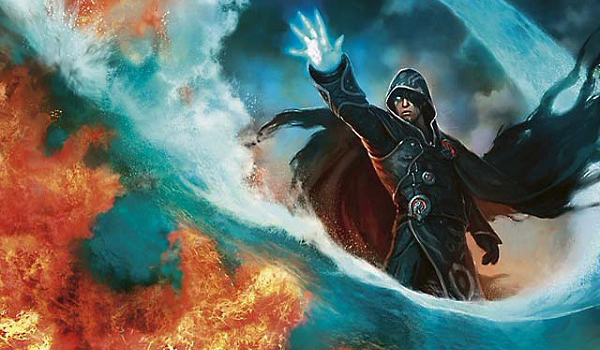
By complete coincidence, this is a rather timely piece. The finals of GP Dallas were a control deck versus a sort-of control deck. In fact, the winner, Kevin Mackie and his Skred Red deck, seem to have already picked up on a lot of what I'm going to say today. If true, bravo sir. You may be clairvoyant. I'd also like to point out that I mentioned Skred's power several months ago. No point to make, just shameless bragging.
I also want to give a shoutout to 12th place finisher Zane Houston. Zane frequents the same game shop I do and regularly demolishes my Merfolk with his Rock deck. Nice job getting a stream highlight and a Top 16! And especially nice job on doing so well with an interactive deck.
[wp_ad_camp_1]
The Problem
To summarize and paraphrase the opinions that I commonly hear, and those expressed in the comments of my first article on aggressive decks, Modern is too diverse and fast for a control deck to thrive. There are simply too many decks that attack from too many angles to for a deck to defend against. There are incredibly fast aggressive decks, decks that play creatures that scale, midrange decks, toolbox decks, fair combo decks, degenerate combo decks, and Dredge. Trying to have answers to all of those decks puts too much strain on your resources and the lack of a universal answer à la Counterspell leaves control players stretched too thin to survive.
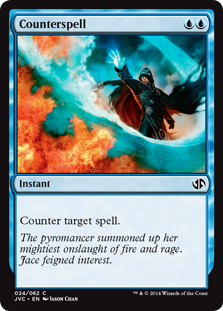 The difficulty associated with answering every deck means that action is favored over reaction. The more time you take not trying to win, the more likely it is that your opponent will find what they need to win. You can't answer everything. In order to accommodate this reality, decks that want to take the control role have to play a midrange game of disrupt-and-interact so that they can drop their own threat and then ride it to victory. One problem with this is that if you're going midrange you're going to be up against Jund. And no deck has proven that they can be Jund as well as Jund. Thus the only viable path for those who don't like aggressive decks or combo is to play Jund or worse Jund.
The difficulty associated with answering every deck means that action is favored over reaction. The more time you take not trying to win, the more likely it is that your opponent will find what they need to win. You can't answer everything. In order to accommodate this reality, decks that want to take the control role have to play a midrange game of disrupt-and-interact so that they can drop their own threat and then ride it to victory. One problem with this is that if you're going midrange you're going to be up against Jund. And no deck has proven that they can be Jund as well as Jund. Thus the only viable path for those who don't like aggressive decks or combo is to play Jund or worse Jund.
I sympathize with this point of view. I really do. However, the time I've spent thinking about how Modern behaves and what decks constitute the metagame has changed my perspective.
How Players See Control
I think that when players approach control in Modern they are making two mistakes. One is a conceptual mistake about what it means to be control and the other is a perceptual mistake about Modern itself. I think that players have an unrealistic view of what it means to be control in Magic and they look at the Modern metagame incorrectly. From my perspective, the format is ripe for a correctly built control deck to succeed.
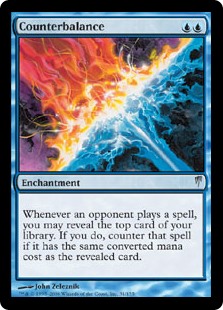 Based on conversations I've had about control and comments on the subject from many different sites, I believe that most players think of control in terms of Legacy Miracles. Decks that play entirely reactively, answer everything the opponent does, and win the game well after the opponent has lost. Their win condition is becoming undefeatable. This is not surprising, as early Magic was dominated by draw-go decks that did exactly that, to the point that Wizards has been leery of counterspells ever since. Ravinca-Theros Standard's Azorius Control is another excellent example. Decks like this aren't viable in Modern.
Based on conversations I've had about control and comments on the subject from many different sites, I believe that most players think of control in terms of Legacy Miracles. Decks that play entirely reactively, answer everything the opponent does, and win the game well after the opponent has lost. Their win condition is becoming undefeatable. This is not surprising, as early Magic was dominated by draw-go decks that did exactly that, to the point that Wizards has been leery of counterspells ever since. Ravinca-Theros Standard's Azorius Control is another excellent example. Decks like this aren't viable in Modern.
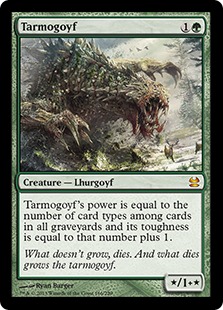 The problem I have is that if you define control in those terms you are disregarding the vast history of control decks. If you go back and do the history, that type of control deck has been far less prevalent than the control archetype as a whole. Midrange style control, commonly called tap-out control, and combo-control decks have a long and decorated history in Magic.
The problem I have is that if you define control in those terms you are disregarding the vast history of control decks. If you go back and do the history, that type of control deck has been far less prevalent than the control archetype as a whole. Midrange style control, commonly called tap-out control, and combo-control decks have a long and decorated history in Magic.
Toward the end of Affinity's time in Standard, mono-blue decks packing lots of counterspells began to gain metagame share. These decks spent the first few turns staying alive and then dropped Keiga, the Tide Star and took the initiative, tapping out every turn to overpower their opponent with their more powerful win conditions. The following Standard saw Gifts Ungiven control decks that won by tutoring up a recursion engine that they'd tap out for every turn. 5-Color control took the control role until it landed Broodmate Dragon and suddenly seized the initiative. Next-Level Blue did this in Extended. There's more to control than being an answer deck.
How I See Control
When I think about control, I think about decks with a large number of answers and a small number of threats. Each threat is not only capable of winning the game by itself, it can shape the game around itself. Once it's on the table, it becomes a must-answer threat and forces the opponent to yield the initiative. They cannot continue to pressure the control player because their win condition will kill them if left alone. How and when the threat is deployed is less important than how it changes the dynamic of the game.
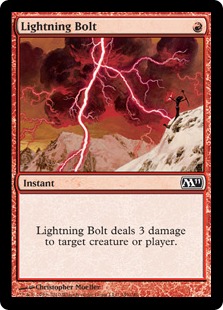 I also believe that a real control deck should maximize its hard answers. Lightning Bolt is a good, efficient answer, but it's still a soft answer because it asks if the target has three toughness or less. When I'm playing control, I want my answers to ask only if they can target the threat. If they can, it's dead. Period. This is why I have long thought of Jeskai Control as a slow burn deck rather than a control deck. Control answers should be hard answers.
I also believe that a real control deck should maximize its hard answers. Lightning Bolt is a good, efficient answer, but it's still a soft answer because it asks if the target has three toughness or less. When I'm playing control, I want my answers to ask only if they can target the threat. If they can, it's dead. Period. This is why I have long thought of Jeskai Control as a slow burn deck rather than a control deck. Control answers should be hard answers.
When I think about control, I see a deck that wants to deplete opposing resources and then force the opponent to answer it instead. True "control" like Miracles is unnecessary—its goal is to invalidate the opposing strategy. Therefore, I have no problem with the fact that draw-go isn't viable. What I don't like is for control decks to only masquerade as control decks. As much as possible, they should be decks with hard answers. This is one reason Jund does so much better than Jeskai.
How I see Modern
I see Modern with a lot of deck diversity, but not much archetype diversity. It is dominated by aggressive decks with a small number of midrange and combo decks. There may be a wide variety of decks that see play, but most will fall under some part of the aggressive deck banner as I've been discussing for the past few weeks. And all of these decks are vulnerable to hard answers.
I'll prove it. Open the Top Decks page in a new tab. Look at Tiers 1 and 2. Count the number of aggressive decks, fair decks, combo decks, and ramp decks. As I'm writing this article, I count eleven aggressive decks, three fair, one combo, and three ramp decks. I count Abzan Company as an aggressive deck, but I won't fault you if you count it as combo. Regardless, aggressive creature decks outnumber all the other decks combined. This is an aggressive format.
As a result, control decks can afford to focus on those creature decks and accept some weakness to the other archetypes because they're not likely to see them at all! You are far more likely to enter a field full of aggressive creatures than of Tron and Jund. I think that control players should just accept this reality and take advantage.
How Do I Approach the Problem?
I'll lead off by saying that Counterspell would not solve the problem that players believe control has in Modern. It would definitely induce more players to pick up the archetype, but it doesn't change the underlying reason that control decks struggle in Modern. Let me explain.
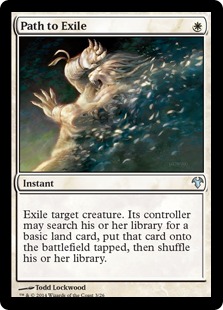 I don't see the lack of control decks in Modern as the result of control being bad in Modern. I see it as the result of control players stretching themselves too thinly and allowing themselves to become bad Jund. Because I see Modern as an aggro-dominated format, and because I understand statistics and can read the Top Decks page, I know that if you want to answer the format you do that by answering creatures. Not just small creatures, but any creature. I blame the focus on Lightning Bolt for Eldrazi's rise and Jeskai Control's downfall. Control struggles because they don't play the right answers to the metagame now, answers which do actually exist.
I don't see the lack of control decks in Modern as the result of control being bad in Modern. I see it as the result of control players stretching themselves too thinly and allowing themselves to become bad Jund. Because I see Modern as an aggro-dominated format, and because I understand statistics and can read the Top Decks page, I know that if you want to answer the format you do that by answering creatures. Not just small creatures, but any creature. I blame the focus on Lightning Bolt for Eldrazi's rise and Jeskai Control's downfall. Control struggles because they don't play the right answers to the metagame now, answers which do actually exist.
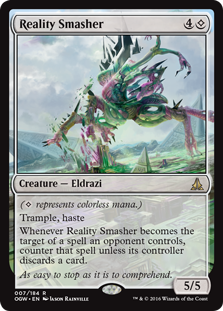 Because control decks need to answer creature decks, I believe that they need to actually answer them. Not hope that they hit the right answer at the right time but that any answer drawn anytime will do the job. Some may work better than others, but one of them should be a hard answer that cleanly one-for-ones any creature it targets.
Because control decks need to answer creature decks, I believe that they need to actually answer them. Not hope that they hit the right answer at the right time but that any answer drawn anytime will do the job. Some may work better than others, but one of them should be a hard answer that cleanly one-for-ones any creature it targets.
I acknowledge the speed of the format and the ability of many decks to hemorrhage threats faster than you can answer them. This is why I also believe that control decks need some forgiveness built into them. They aren't required to keep up with aggressive decks exactly, just enough so that they survive to sweep the board and recover. Lifegain is also a good idea. I also dislike control decks that are vulnerable to hate. Auto-losing to Blood Moon or Rest in Peace is not where I want to be with a control deck.
Therefore, as I see it, the problem with control isn't control itself; it's players misunderstanding the metagame and subsequently misbuilding their control decks. They're casting too wide a net and their results are suffering.
The Fear
"What if I hit a combo deck?" is the frequent whine I receive in response to this position. Players are deathly afraid of running into a deck that they cannot answer and just losing. This is behind the impulse to play proactive decks that pressure slower decks so that they don't just durdle around and lose. My reaction is always, "So what?" Combo is a very small portion of the metagame. Yes, you lose to Grishoalbrand. No, it doesn't matter because that deck isn't barely Tier 3 in most metagames.
Be realistic; the odds of hitting any combo deck is very low and The Fear they cause is entirely irrational. The combo deck you are most likely to see is Ad Nauseam, which is only 2.1% of the metagame as I write this sentence. The aggro decks just of Tier 1 constitute 36.6% of the total metagame. You are far more likely to be matched against aggressive decks than anything else. So stop worrying about other decks. That's what a sideboard is for.
My Solution
Players that want to play control should play a control deck. Not a midrange deck, not a glorified burn deck. A deck that targets creatures with hard answers, has hard-to-answer threats that win the game, and has some forgiveness built in to compensate for a slow start. And I know that such a deck is viable in Modern. I lose to it frequently.
There are several players in my local metagame that regularly run a UW Control deck that matches my exacting standards. When I'm on Merfolk I have to get lucky to beat them. When they're running well, they dominate the normally aggressive metagame I play in. Jund is no worse than a coin flip for them and even Bant Eldrazi is beatable (when they don't get really broken Eldrazi Temple draws). If you want to run a real control deck, I think you should start with their example.
I don't have the lists they currently play available (nor would I post them if I did) but they look very similar to this list:
UW Control, by David Ernenwein
Now this is a control deck I can get behind. It is effectively pre-boarded against aggressive decks and leaves worrying about combo or control decks to the sideboard. It's a bit soft to Tron even with Crucible and Ghost Quarter, but you cannot be strong everywhere. You should pick your battles based on what you are most likely to see, and then prepare for eventualities. You may not beat everything reliably, but you can beat aggressive decks and Jund consistently. I know because I've seen it happen.
Go to War Against the Enemy You Know
I do not understand how players complain about Modern being overrun by aggressive decks, and turn around and complain that the format is too diverse and large to answer everything. If the format is as aggro-dominated as they claim, why not target those decks? If it really is as linear as they claim, then it should be fine to ignore the other archetypes.
The format cannot be simultaneously as narrow as they claim and too wide to respond to. I think that there are a lot of aggressive decks, and thus I see an opportunity for control decks. Narrow your focus and build according to the meta as it actually exists. I think you'll find control isn't that difficult to build.


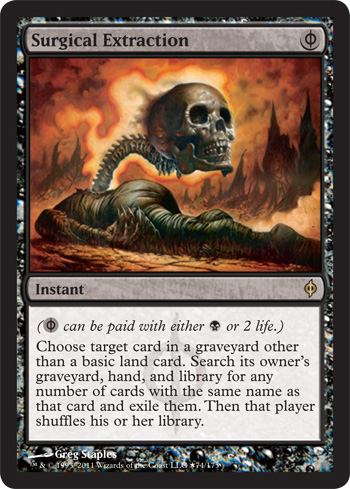


Interesting list for UW control. I’ve played a similar style of UW control since Myth Realized came out. The deck you posted really benefits from running Myth Realized over the elspeths. Elspeth is too slow for the maindeck since you can’t really tap out against most of the field in modern. At best, elspeth is a card for the SB in your jund/abzan/bant eldrazi matchups.
Myth realized is the card everyone trying to play control is overlooking imo. The key here is that control really can’t afford to tap more than a single mana to put a threat into play at sorcery speed, which is why it is so good. Huge ceiling that survives your own Verdict to attack the same turn for a bare minimum of tempo investment. Myth realized is usually a very fast clock by the time the board is stable.
Oooooh, I think I like that card! Thanks for the tip!
I mean its an interesting notion I guess but I dont think you’re going to do very well by just throwing in the towel against every non-aggro creature deck. Rolling the dice to just not hit tron valakut dredge or something like ad naus or lantern? Isnt this the definition of a meta deck?
Also im not convinced on redefining control – its always meant a deck where once you turn a corner it no longer matters what your opponent does because you have answers to everything, and you can win at your leisure.
Defining control as a deck thats mostly answers and a few threats would include all kinds of snapcaster decks and probably jund frankly. Its 4 goyfs some manlands and kalitas scooze the rest is answers.
Darcy, is that comment directed at me or David Ernenwein? It reads like it’s addressing the article but threaded to my comment.
It’s not really rolling dice, it’s playing the odds. You’re supposing that there is an equal chance to hit any archetype in a given tournament. I’m saying that there isn’t, the odds of hitting aggressive decks and only aggressive decks is very high. As a consequence you can afford to cede some game one percentage to those decks that you’re unlikely to see in order to maximize your win percentage against the aggressive decks you are guaranteed to hit.
This is my UW Control list. I think it accomplishes what you wanted to do while leaving the combo/ramp matchups much more intact.
4 Myth Realized
4 Snapcaster Mage
1 Secure the Wastes
4 Serum Visions
2 Ancestral Vision
1 Gitaxian Probe
4 Path to Exile
2 Blessed Alliance
1 Detention Sphere
3 Supreme Verdict
2 Spell Snare
2 Remand
1 Logic Knot
2 Negate
4 Cryptic Command
4 Flooded Strand
4 Polluted Delta
3 Hallowed Fountain
2 Celestial Colonnade
2 Mystic Gate
3 Island
2 Plains
3 Ghost Quarter
SB: 2 Summary Dismissal
SB: 1 Vendilion Clique
SB: 1 Stony Silence
SB: 1 Shadow of Doubt
SB: 1 Hallowed Moonlight
SB: 1 Runed Halo
SB: 2 Disenchant
SB: 2 Celestial Purge
SB: 2 Surgical Extraction
SB: 1 Fragmentize
SB: 1 Dispel
I would consider Sacred Mesa as a win con way before Myth Realized. It’s a better tool when from behind, for ir creates all-purpose blockers, and It’s not mana intensive as well.
Pre-boarding against aggression definitely seems like the way to go in Modern, and I’m glad that you’ve taken to banging this drum, David. That said, the list you noted is going to have a whale of a time casting Elspeth on curve with 23 lands (4 of which enter tapped). Ancestral Vision also strikes me as swingy, as it’s a great card in your opener but not so much at other times (not to mention the obvious tension with Colonnades). However, these are all quibbles, and the general shape of the deck looks like other successful control decks I have seen.
Agreed, 4 colonnades is too many for the list, and 23 lands is also a bit low for 6 cmc elspeth. Likewise, staying at 4 ghost quarter when you get down to 23 lands is a bit suspect. The list seems a bit raw and untested imo.
This is as close to the lists that I’ve lost to as I could get. I knew the cards that they played and the land count, I had to fill in the gaps from there.
Give him a break guys. He did say he came up with it loosely from what he could remember other peoples lists looking like.
Short version; nice article.
Long Version
In understand where you are coming about the state of control in Modern and Magic as a whole. Altough i can understand the part about preparing for the aggressive decks and leaving the sideboard to compensate for the weaknesses. However…
You are ignoring completely the fact that we have both a Control, and a tapout Control deck in Modern: Jeskai Nahiri and BTL Scapeshift. And it actually plays the way sucessful control decks (in most formats) do: a quick win condition. Jeskai Nahiri is a consistent control shell (i strongly disagree with the “glorified burn deck” statement), and the “soft answers” are precisely what allows it to get ahead of the major contenders right now: Dredge and Infect. Burn, Affinity and Death Shadown should be considered as well wonderfull matchups for Jeskai.
Scapeshift doesn’t have that advantage (it has a bad matchup vs Infect, for instance), but we can easilly compensate for that as well, by simply tunning the colors. I’ive been testing a 5c BTL version with Lingering Souls and it’s been doing wonders when i get it. With L. souls, It’s hard to lose vs infect, almost impossible to lose to Affinity, and Burn can easilly be compensate with Pulse of Murasa, Timely, or Blessed alliance (double duty for Infect as well).
I understand you point, but results, and i’m reminded of the las WMCQ season proved otherwise: control shells have a certain degree of sucess when packing Combo kills. Thopter Combo and Scapeshift each won my country’s two WMCQ (Portugal). Scapeshift algo brought at least one more in Japan. And i do remember a France WMCQ with UW Tron top8’d. Seems low in numbers? Well, control decks ARE low in numbers currently, so it really can’t be helped that we have so few examples.
Last GP, we had Grixis Control, but also Jeskai. And sure, non of them had the “combo kill” that i’m mentioning. But the enviroment was also assaulted by unfair decks, that lose to themselves and lose gas pretty easilly if answered properly early (Infect and Dredge), so it actually makes sense to pack those soft answers.
I disagree with you, in terms that we do not need to shoft entirely to those type of decks. BUt i agree that they are A viable route, just not THE viable route 😉
PS: counterspell wouldn’t fix Modern indeed. We need a Pyschatog and Orim’s Chant reprint to see Control strong and not oppressive again. (and Psychatog would never fit in Dredge without the penalty of making the deck a lot slower in case you try to argue that).
Just my 2 (long) cents
If Scapeshift and Jeskai Nahiri were that good the results would show at high level events. Reality is, Nahiri is at best a turn 6 win assuming nothing disrupts her accumulating loyalty. The deck abandons boardwipes in favor of lightning bolt, helix, occasionally electrolyze and snapcasters to flash those back. I don’t understand either why there is a lack of verdicts or even anger of the gods. Scapeshift’s problem is that its wincon relies on mountains, and the more you expand the manabase to handle for or five colors the more you dilute its primary win condition. The reason GR ramp decks have been thriving where control scapeshift is losing meta shares, well one reason, is that it always has enough mountains to win, and that includes versions that run a couple copies of scapeshift for non-creature wins.
You are correct, and their slide down the power charts reflects this weakness. I’ve explained my position of Jeskai a lot, but I think Scapeshift is a more instructive example. In a world dominated by Twin Scapeshift was the combo deck you wanted and was able to play the control roll very well, but the format has sped up and left it behind. It cannot play a true control role anymore, it doesn’t have the space, and the kill is too slow to keep up with the format. Trying to be a combo/control deck is much harder now than it used to be, so I think you should abandon the combo part and focus on control.
I’ve got this control deck that wins first game at 70% or more against all tier 1 decks (Affinity, Burn, Death’s zoo Dredge, Infect, Bant eldrazi) except for jund which It beats at 55%
The overall tactic is to slow the game down to a crawl and then slowly beat the opponent 1-2 damage at the time for the rest of the game.
It’s resistant to a lot of tier 2 decks as well and probably beats more than half of the tier 3.
It follows all the principles of traditional control, by removing threats, and winning with just a few life left at the end.
http://www.mtgvault.com/wickeddarkman/decks/zombiebridge-v6-deadward-2/
First off, I really enjoy your breakdown pieces like this. If I don’t leave with new knowledge, I usually have new ideas about the metagame. UW control in Modern has been my project since Modern’s beginnings, and in particular since Eldrazi Winter. I agree with most of your points, most particularly that Control is viable, and must have broad answers and a handful of key bombs to close out with (preferably castable turn after turn once you “turn the corner” with a wrath or similar). Personal preference plays a huge role in choosing certain number of cards, but something I have found for a deck like this is that Mana Leak is very weak, and you certainly don’t need quite as many spot removal spells.
https://www.mtggoldfish.com/deck/480810#paper
Is my most recent take, and while some choices necessarily appear odd or slow for Modern, they have performed very well in a well balanced shell. Secure the Wastes is a serious contender for control MVP, being able to block early and Snap back later for a win con. Blessed Alliance has put UW on the map versus Infect, and improved the main deck mu vs burn of all flavours. I have beaten Tron by playing an attrition game, which I never thought possible. Dodging Ulamog is important though.
Thank you for your efforts to adjust the misconception that Modern is not a format that control can thrive in.
here is my current draw-go control, with hard answers foe everything.
1 Blessed Alliance
2 Vendilion Clique
3 Supreme Verdict
3 Myth Realized
3 Thought Scour
4 Disrupting Shoal
4 Gitaxian Probe
4 Logic Knot
4 Path to Exile
4 Think Twice
4 Snapcaster Mage
4 Plains
4 Flooded Strand
4 Ghost Quarter
2 Hallowed Fountain
1 Glacial Fortress
6 Island
3 Celestial Colonnade
1 Cryptic Command
3 Blessed Alliance
2 Spell Snare
3 Stony Silence
2 Timely Reinforcements
4 Surgical Extraction